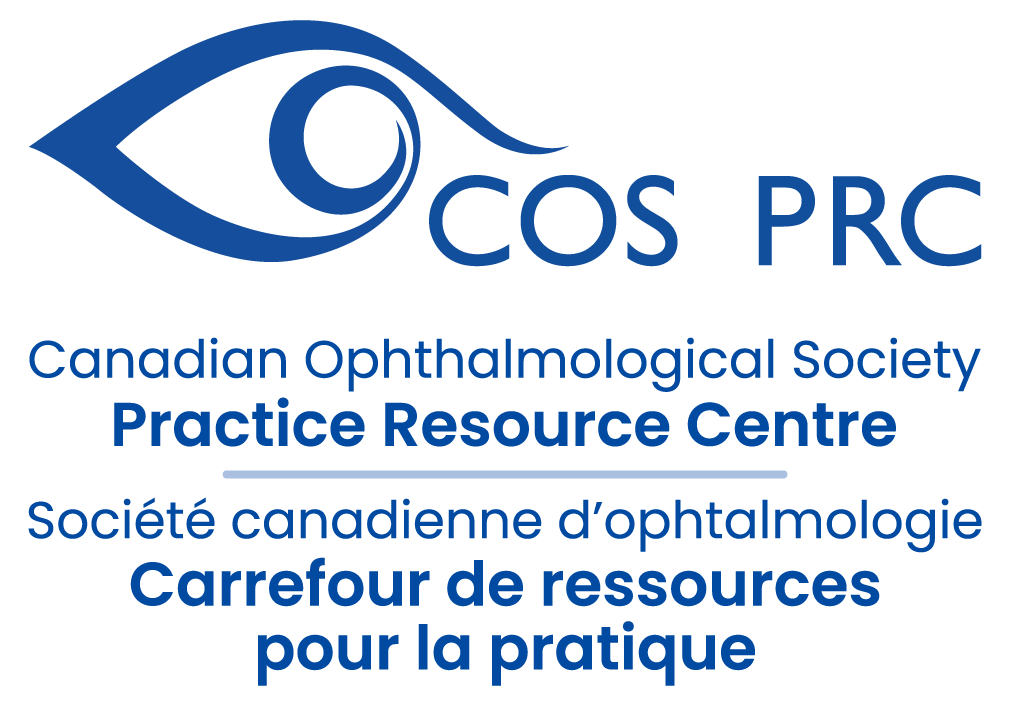COS Forum 2023: Building the Future of Ophthalmology Webinar
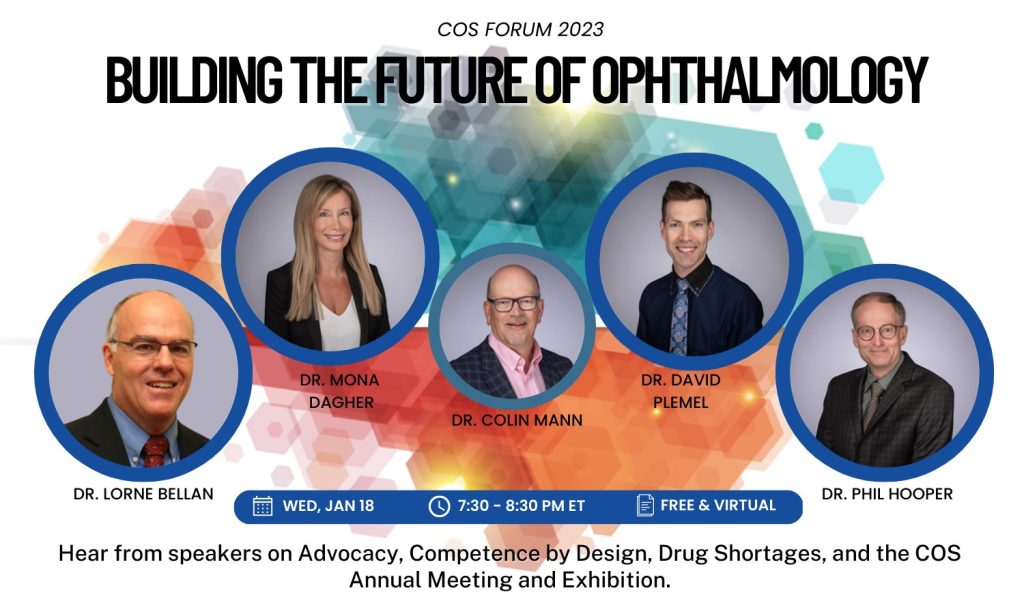
COS Forum 2023: Building the Future of Ophthalmology Webinar
Date: January 18, 2023
Time: 7:30-8:30PM ET
Join us for this free virtual event and learn about the future direction of the Canadian Ophthalmological Society. Hear from speakers on Advocacy, Competence by Design, Drug Shortages, and the COS Annual Meeting and Exhibition. We want to hear from you! Participate in polling questions and our lively Q&A, and tell us how we can support you.

Issue IV – 2022 Video Journal of Cataract, Refractive, & Glaucoma Surgery

The 4th issue of the 2022 Video Journal of Cataract, Refractive, & Glaucoma Surgery is out! Given the tremendous interest in Flange techniques developed by Brazilian surgeon Dr. Sergio Canabrava, the entire program is devoted to this new surgical procedure. By eliminating suturing for intraocular devices and dislocated intraocular lenses, the ophthalmic surgeon has a powerful new weapon in our surgical armamentarium.
The VJCRGS is completing its 38th year of providing the highest quality of education to anterior segment surgeons around the world. With a new issue every quarter, the Journal is a free benefit for being a member of COS, allowing access to all 38 years of content.
Table of Contents Volume 38, Issue 4, 2022
Double Flanged Polypropylene Technique
Double Flanged Polypropylene……………………………… Drs. Sergio Canabrava, Gustavo Rodrigues,
Mayarn Cardoso, & Thiago Galvao, Brazil Sleeve Assisted……………………………………………………. Dr. Behzad Barazandeh, Iran
Toric and Multifocal…………………………………………………………………………….. Dr. Yuri McKee, USA
Piercing Flanged Technique…………….. Drs. Durval Carvelho, Lara Picanco, & Caroline Lima, Brazil
Haptic Externalized………………….. Drs. Calin Petru Tataru, Paul Filip Curca, Catalina Ioana Tataru,
Maria Dudau, Alexandra Mosu, & Laura Denisa Preoteasa, Romania Using an Injector…………………………………….. Dr. Ahmed Samir, Saudi Arabia
New IOL Design…………………………………………………………….. Drs. Sheetal Brar & Sri Ganesh, India
Ahmed Segment……………………………… Drs. Victoria de Rojas, Marcelino Alvarez, Patricia Simon,
Lorea Zurntuza, & Isabel Escofet, Spain Assia Anchor…………. Drs. Liat Mendel, Haggay Avizemer, & Guy Kleinmann, Israel
Dislocated IOLs………………………………………………………………………. Dr. Cathleen M. McCabe, USA
Prosthetic Iris……………………………………………………………………………… Dr. Altan A. Ozcan, Turkey
5 Year Overview………………………………………………………………………… Dr. Sergio Canabrava, Brazil
Click here to watch the latest issue:

World Conference on Ophthalmology & Eye Care
The World Conference on Ophthalmology & Eye Care will take place from 21st to 23rd August 2023. During 3 science-packed days, top experts in all fields of ophthalmology will connect from around the globe to shape the future of eye care. The program will feature more than 20 innovative sessions and an average of 9 hours of live and engaging content per day! We are excited to make the Eye Care Week 2023 a place where you can learn about the most recent research and practice, network with colleagues, and contribute to the success of the conference. Ophthalmologists, Doctors, Health care professionals, Nurses, Clinicians, Academicians, Medical experts, Students from reputed medical schools, Researchers, Professors, Scientists and experts in the field of ophthalmology will share their novel research findings, innovations and experiences at our global podium. Join us, as we celebrate this edition of extensive sharing of knowledge & the leading practices from the world’s bests in the field of Ophthalmology.
For more information and to register, please click the link below:

Hawaiian Eye 2023 – Retina

Hawaiian Eye is a meeting where everyone is motivated to look at new technologies and ideas together. The conference includes practice management topics to educate physicians, nurses and administrators in the room together to gain a shared viewpoint from the entire practice. There are interactive pro/con debates to create a fun and interesting format featuring point/counterpoint panel discussions with audience participation.
CPD Credits
Hawaiian Eye and Retina offer separate educational programs where comprehensive ophthalmologists can earn 32.5 CME credits, retina specialists can earn 25.5 CME credits, nurses/allied health professionals can earn 17.5 CNE/JCAHPO credits and administrators can earn 17.5 COE credits.
Access Details
For more information and to register, visit the event website.
Eye Care Competency Framework

The WHO ECCF is a tool to enable quality care and integrated service delivery that meet the needs of the population.
The WHO Vision and Eye Care Programme developed the ECCF as a critical tool through which the workforce can be planned and developed with aligned competencies. This tool can assist WHO Member States and stakeholders in planning and maintaining an effective eye care workforce in terms of composition, deployment and ongoing availability to meet population needs. Additionally, the ECCF can
be used for educational and training purposes in eye care, regulation, and performance monitoring. The broader goal of the ECCF is to improve health and social and economic development outcomes by ensuring universal availability, accessibility, acceptability, coverage and quality of the eye care
workforce.
Download the full article here.
Canadian Eye Care Today – Volume 1, Issue 3
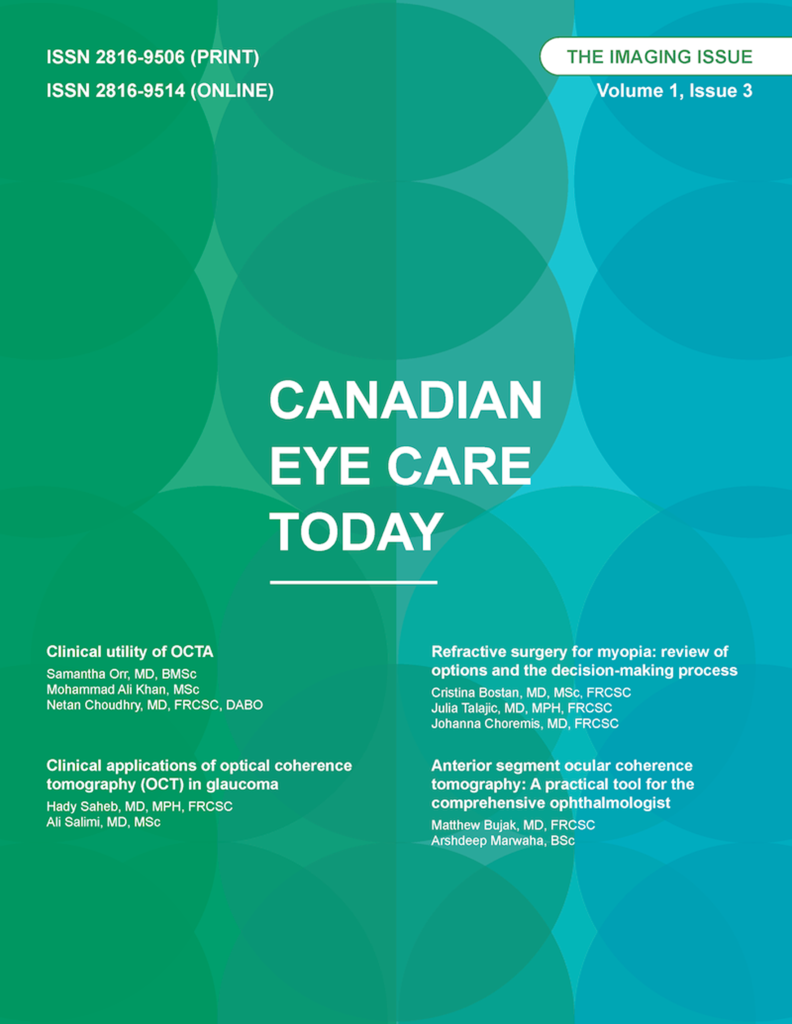
The latest issue of Canadian Eye Care Today for 2022 is now available for your reading pleasure. This publication examines issues and topics that are relevant to today’s clinician in the treatment and management of eye disease from a Canadian perspective.
Some of the content you will find in this issue:
Clinical utility of OCTA
Samantha Orr, MD, BMSc
Mohammad Ali Khan, MSc
Netan Choudhry, MD, FRCSC, DABO
Refractive surgery for myopia: review of options and the decision-making process
Cristina Bostan, MD, MSc, FRCSC, DABO
Julia Talajic, MD, MPH, FRCSC
Johanna Choremis, MD, FRCSC
Clinical applications of optical coherence tomography (OCT) in glaucoma
Hady Saheb, MD, MPH, FRCSC
Ali Salimi, MD, MSc
Anterior segment ocular coherence tomography: A practical tool for the comprehensive ophthalmologist
Matthew Bujak, MD, FRCSC
Arshdeep Marwaha, BSc

Copyright © 2022 Catalytic Health, All rights reserved.
CJO: December 2022 Issue Highlights
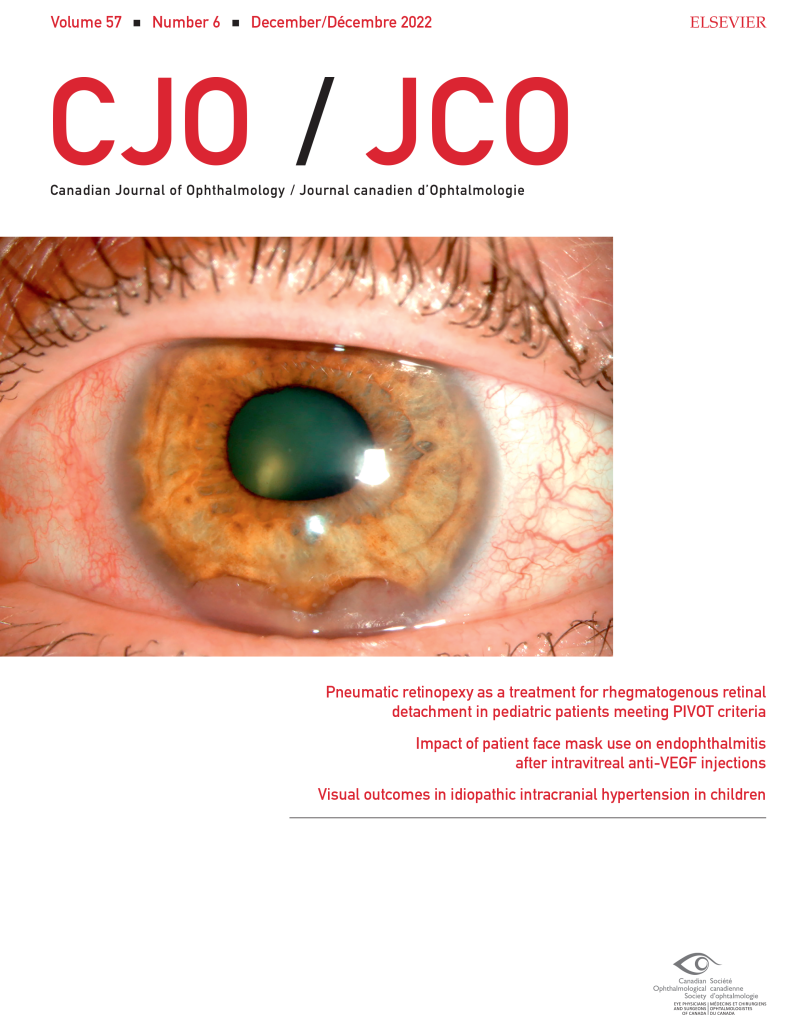
The December 2022 CJO is now available online. Here are some of the highlights:
Resident Perspectives + visual abstract: Our talented team of residents have summarized 5 articles with a focus on what’s most relevant to ophthalmology learners here in Canada and around the globe, including the article featured in our December visual abstract, Pneumatic retinopexy as a treatment for rhegmatogenous retinal detachment in pediatric patients meeting PIVOT criteria.
Original research articles:
• University of Toronto’s redesigned ophthalmology curriculum and eye dissection lab
• Effect of bariatric surgery on macular and peripapillary choroidal structures in young patients with morbid obesity
• Visual outcomes in idiopathic intracranial hypertension in children
• Dacryops and clinical diagnostic challenges
• Impact of patient face mask use on endophthalmitis after intravitreal anti-VEGF injections
Photo essays and case reports:
• Multimodal imaging in a case of rubella retinopathy [photo essay]
• Ophthalmic complications of immune checkpoint inhibitor therapy for metastatic ovarian cancer [photo essay]
• Late-onset diffuse lamellar keratitis after treatment with cenegermin [case report]
• Sebaceous cell carcinoma presenting as ocular Marjolin ulcer following immunosuppression for a chemical burn [case report]
• Secondary pseudotumour cerebri syndrome in children: clinical characteristics and long-term outcomes [correspondence]
Follow the CJO on social media:
Facebook: CanJOphth
Instagram: @cjo_jco
LinkedIn: CJO – JCO
Twitter: @CanJOphth
7th Orbis & CCOR Event: Experiences and Opportunities in International Eye Health

Topic: Orbis & CCOR: Experiences and Opportunities in International Eye Health
Date: Wednesday, December 14th, 2022 8-9:30PM EST.
Time: 8:00 pm – 9:30 pm EST
Location: Zoom Webinar
You are invited to a new Speaker Series event hosted by Orbis Canada and CCOR, specifically designed for residents and young ophthalmologists.
For this special Orbis Speaker Series event, we have teamed up with the Council of Canadian Ophthalmology Residents (CCOR) to share the global health experiences of four talented individuals. Dr. Hunter Cherwek will speak about Orbis’s Volunteer Faculty program and share some personal experiences from his incredible career. Dr. Maya Tong and Dr. David Plemel will share their own experiences volunteering with Orbis. Finally, Dr. James Whelan, a veteran of nine Orbis programs spanning nearly two decades, will offer his knowledge and insights about global health and Orbis’s work around the world. All speakers will share important lessons learned during their schooling, Orbis involvement and current careers, helping to guide and shape possible new opportunities for attendees.
Following the presentation, there will be a Q&A session with our panelists.
Panelists include new young ophthalmologists and veterans of Orbis missions across the country :
* Dr. Hunter Cherwek, MD – Vice President, Clinical Services & Technology, Orbis International
* Dr. Maya Tong, MD, FRCSC – Cornea and Anterior Segment Specialist
* Dr. David Plemel, MD, FRCSC – Orbital and Oculoplastic Plastic Surgeon
* Dr. James Whelan, MD, FRCSC – Chief, Division of Ophthalmology, Department of Surgery at Memorial Hospital
We will share how residents and young ophthalmologists can get involved with Orbis and global ophthalmology in their current careers, and we will guide and shape possible new opportunities for all attendees.
Learning objectives: All speakers will share important lessons learned during their schooling, Orbis involvement and current careers, helping to guide and shape possible new opportunities for attendees.

COSIG-GEICIO December Upcoming Events
The Canadian Ophthalmology Student Interest Group (COSIG-GECIO) is a collective run by medical students interested in ophthalmology from across Canada. Our goal is to support other medical students interested in ophthalmology by sharing resources, facilitating connections, and promoting student research and advocacy efforts.
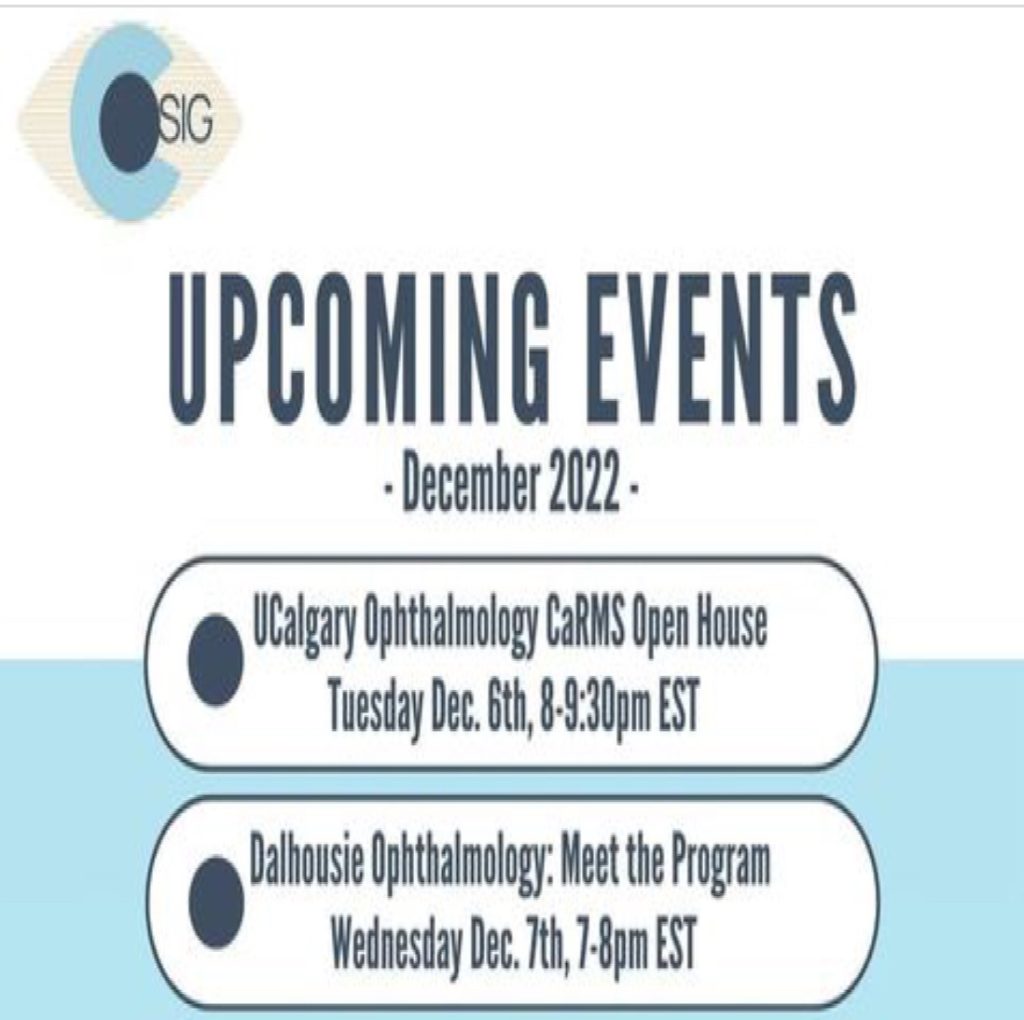
For more upcoming events and to view the calendar click the link below.

